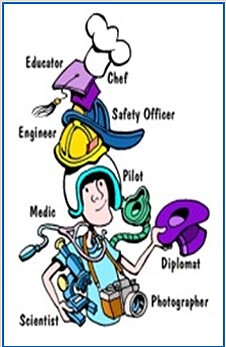When I was younger, I was given many forms of the same advice: at some point, I would be better off to double down on either being an engineer or a manager if I wanted to progress in my career. I was booted from my first job while pretending to be good at everything, naturally, I thought this was a good idea.
Life looked at my choice with as much consideration as my parents when I told them I wanted to join the infantry in kindergarten - which was not at all. I joined a startup, and subsequently another startup. I never got to choose. Working at an early-stage startup is like conducting an old locomotive on a half-done railway. You juggle between keeping the engine running, because just like your code it breaks a lot, and building the railway with whatever you find along the way, you are selling a product before it is fully ready. The game is over when either stops.
Along that journey, I realize that career choices are not complicated, they are complex. Complication is when a system consists of multiple parts with intricate interactions. As overwhelming as the parts and interactions could be, they follow some universal laws that eventually make the system knowable. Complexity is when the parts and interactions are not fully knowable and the best we can do is some reasonable prediction. A car is complicated, the traffic is complex. I think people who gave me advice earlier understood this. But in an attempt to simplify a complex subject, half of the truth was lost.
I think when people talk about the engineer/manager choice, they probably mean that at the point you have to weigh your options as being an engineer or a manager, you have collected all the low-hanging fruits in your career. To proceed, you need a level of focus you haven’t experienced earlier. And as it is hard to focus on two hard things at the same time, you would be better off focusing on only one. Which is also true for my parents’ expectations of me.
While that is true, to perform at the peak level you cannot spread your effort all over the place, there is another half of the truth, that is the choice is neither binary nor permanent. You are probably overthinking if you view the management as a critical, life-changing decision. The move to management is not a promotion, it is a change in scope of work in which you drop existing responsibilities to pick up others. And if you hate the new responsibilities, you can always go back to the engineering track. Most companies have had sufficient understanding on this matter and will be glad to provide some rotation options for their employees.
The higher you advance in your career, the stronger the element of leadership exists in your scope of work. People in the technical track get promoted for working on hard and impactful problems. You wouldn’t get to work on the hard problems unless the easier ones were effectively delegated to someone else. The most impactful problems tend to be ones that once solved provide sustainable advantages for the business. Such problems tend to involve people of different background and function. Someone would need to rally them and align their interests to the shared goal. And yet delegation, communication, and goal alignment aren’t common practices among engineers. Although technical leadership isn’t exactly the same as people leadership, I think you will navigate better if you have an opportunity to learn about how people think, how larger projects are prioritized , and how organizations are run.
From my own experience, alternating between the two roles makes me better at both. In a hard project that challenges my technical prowess, I am more of an engineer. In a more relaxing project, my manager role is stronger so I can oversee things go to the right places. I am a better manager because I understand the morale friction caused by a poorly planned project, and I am a better engineer because I know the red flags of a poor project and when to fire alarms.
The final caveat is that engineer and manager roles exist in a spectrum and it curbs your professional and personal development by forcefully align your options along with the extremes. Not only do most people find themselves somewhere in the middle, but they also move back and forth as their careers progress. People who can turn a technical advantage into a business advantage usually have a blend of engineer/manager in them. You can advance without spending time in management. But if you want to give management a try, you should. Do not let your identity be simply defined by a title.

No comments:
Post a Comment